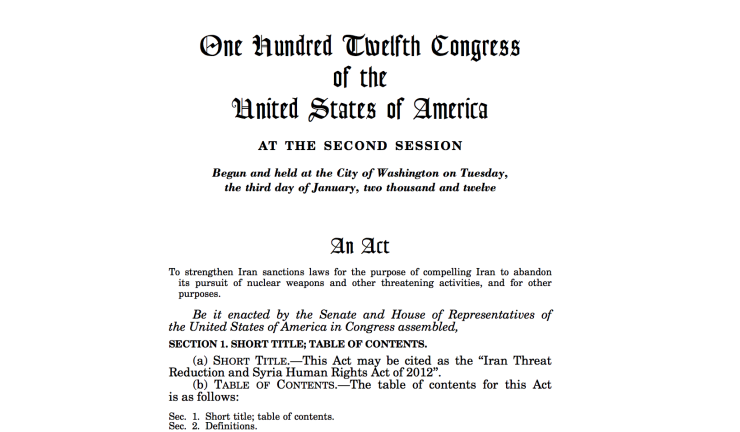Congress Sets Its Sights on Iran
Keen on limiting the impact of sanctions relief for Iran’s Revolutionary Guards Corps (“IRGC”), as well as stymieing any broader outreach between the U.S. and Iran, three separate pieces of Iran-related sanctions legislation have been proposed in the U.S. House of Representatives over the past two weeks. Each of these bills would complicate the task of conducting trade-related dealings with Iran in the months ahead – though for different reasons – and persons interested in resuming trade relationships with Iran or Iranian persons or entities in the weeks ahead would be advised to closely follow the path of these legislative proposals, as the legislation may prove consequential to their activities.
First up is the IRGC Sanctions Act (H.R. 4257), sponsored by the House Intelligence Committee Chairman Rep. Devin Nunes (R-CA-22) along with 26 other House Republican co-sponsors. Notably, the IRGC Sanctions Act would heighten the standard by which the President is authorized to rescind a State Sponsor of Terrorism determination. It would do so by reversing the presumption currently legislated into law, whereby the President has to meet certain stringent reporting requirements and submit a report to Congress detailing his intent to rescind a determination that Country X is a state sponsor of terrorism. Currently, Congress must adopt a Joint Resolution disapproving any proposed rescission in order to keep a state sponsor of terrorism on the SST List. However, under the proposed revised standard in the IRGC Sanctions Act, Congress would have to affirmatively support the decision to rescind Country X from the SST List by adopting a Joint Resolution expressing its approval of the rescission. Considering that Iran, Syria, and Sudan remain the sole countries remaining on the SST List, this provision seems aimed at limiting the President’s options when it comes to rescinding Iran’s SST listing (though I have not seen the Obama administration take any steps suggesting that it was prepared to do so in the short-term).
The IRGC Sanctions Act would also amend the Iran Threat Reduction Act by prohibiting a “U.S. person from knowingly engaging in any financial transaction with, or transfer of funds to”:
(1) The IRGC or any of its subdivisions;
(2) Any of the IRGC’s agents, affiliates, fronts, or aliases;
(3) Any person owned or controlled by the IRGC or its agents, affiliates, fronts, or aliases;
(4) Any natural person who is an official or senior member of the IRGC; and
(5) Any person, for the purpose of avoiding a financial transaction with an individual or entity listed above
Moreover, the IRGC Sanctions Act would bar the President from being able to authorize any transactions prohibited above by issuance of a general license. Instead, U.S. persons seeking to engage in a prohibited financial transaction would have to apply for a specific license from the U.S. Department of the Treasury’s Office of Foreign Assets Control (“OFAC”).
In order to further limit any potential future openings in U.S.-Iran trade relations, the IRGC Sanctions Act would subject Iran to Title IV of the Trade Act of 1974. Critically, this would bar the President from concluding any commercial agreement with Iran and make Iranian products ineligible for receiving non-discriminatory treatment (i.e., normal trade relations with the U.S.). This provision has significance only to the extent that the Obama (or any subsequent) administration lifted the U.S. trade embargo with Iran.
The IRGC Sanctions Act would also amend the Securities Exchange Act by requiring securities issuers to report to the SEC any financial transactions with the IRGC or its subdivisions, agents, aliases, fronts, affiliates, or persons owned or controlled by the IRGC. Such public exposure opens up such securities issuers to considerable reputational risk in the United States; and, as such, this provision would create a serious disincentive for such issuers to engage in or facilitate transactions involving Iranian parties.
Second, House Republican Rep. Peter Roskam (R-IL-XX) introduced the Quarantining the Ayatollah’s State Sponsored Aggression and Militancy Act (“QASSAM Act”) (H.R. 4258), which imposes additional sanctions on entities owned or controlled by the IRGC.
Specifically, the QASSAM Act would mandate the President to impose blocking sanctions on any entity where the IRGC owns a 20% or greater interest in the entity. (Currently, OFAC’s beneficial ownership rules top out at 50% or more.) In order to track IRGC beneficial ownership in Iranian entities, the QASSAM Act also mandates the U.S. Treasury Secretary to establish and maintain a list of every entity to which the IRGC owns any interest that is less than 20% in the entity or maintains a presence on an entity’s board of directors, or otherwise influences the actions, policies, or personnel decisions of the entity.
Finally, the QASSAM Act would provide additional authorities to State and local governments to impose divestment measures on U.S. or foreign persons that engage in investment or business activities with the IRGC. Specifically, the QASSAM Act would permit a State or local government to adopt and enforce measures to divest the assets of the State or local government from, or prohibit investment of the assets of the State or local government in, any person that the State or local government determines engages in investment or business activities with the IRGC or IRGC-related companies. (As we have written before, Title II of CISADA authorized State or local governments to undertake certain divestment measures related to foreign companies investing in Iran’s energy sector.) Moreover, the QASSAM Act would insulate such State or local divestment measures from federal preemption by providing a safe-harbor provision.
Finally, the IRGC Sanctions Implementation and Review Act – introduced by House Democrat Rep. Brad Sherman (D-CA-XX) and reportedly supported by House Republican Rep. Ed Royce, the Chairman of the House Foreign Affairs Committee (“HFAC”) – would amend TRA § 302(b) by stating that “if the President determines … that a foreign person has knowingly [provided support to or conducted certain transactions with the IRGC or any of its agents or affiliates],” then the President shall impose blocking sanctions on such person. The President would be authorized to issue licenses to U.S. persons to engage in otherwise prohibited transactions with such blocked persons and entities.
In order to ensure that the President is fulfilling his duties to target the IRGC and its affiliated entities, the IRGC Sanctions Implementation and Review Act would also mandate the U.S. Comptroller General to submit to the President and certain Congressional committees an annual report identifying all foreign persons not currently subject to sanctions under TRA § 302(b) that, within the preceding three years, have been reported to have conducted transactions or have provided material support to the IRGC or any of its agents or affiliates. Not only can the U.S. Comptroller General can source such information from any credible publication in order to draft its report, but the U.S. Comptroller General can also be the recipient of compiled information from any USG agency, NGO, or any other entity. Upon receipt of this report, the President is obligated to determine whether the evidence is sufficient to impose sanctions against the listed parties and to submit his conclusions in an unclassified form before certain Congressional committees.
Lastly, the IRGC Sanctions Implementation and Review Act would require all securities issuers to report to the SEC any financial transactions with any foreign person identified in the most recent report of the U.S. Comptroller General prior to the commencement of the transaction or dealing.
Together, these bills seek to raise the costs of doing business in Iran, heightening the due diligence that must necessarily be employed by foreign parties regarding their Iranian counterparties. Parties interested in re-engaging with Iran should take care to track this legislation to ensure that their proposed business dealings are not impacted by legislative efforts in the U.S. Congress.




2 Comments
What are the chances that these proposals will become law? Further, to what extent are they symbolic – given that most of the Iranian targets are SDN’s?
The last proposal is the most likely, though the breadth of its support remains unclear. With Congress set to renew the Iran Sanctions Act, the real issue is whether certain ideas in these legislative proposals are subsumed under that renewal legislation.
None of them are entirely symbolic, either. At the very least, each increases the reputational costs of doing business in Iran and, as such, endangers the nuclear agreement.
Comments are closed.